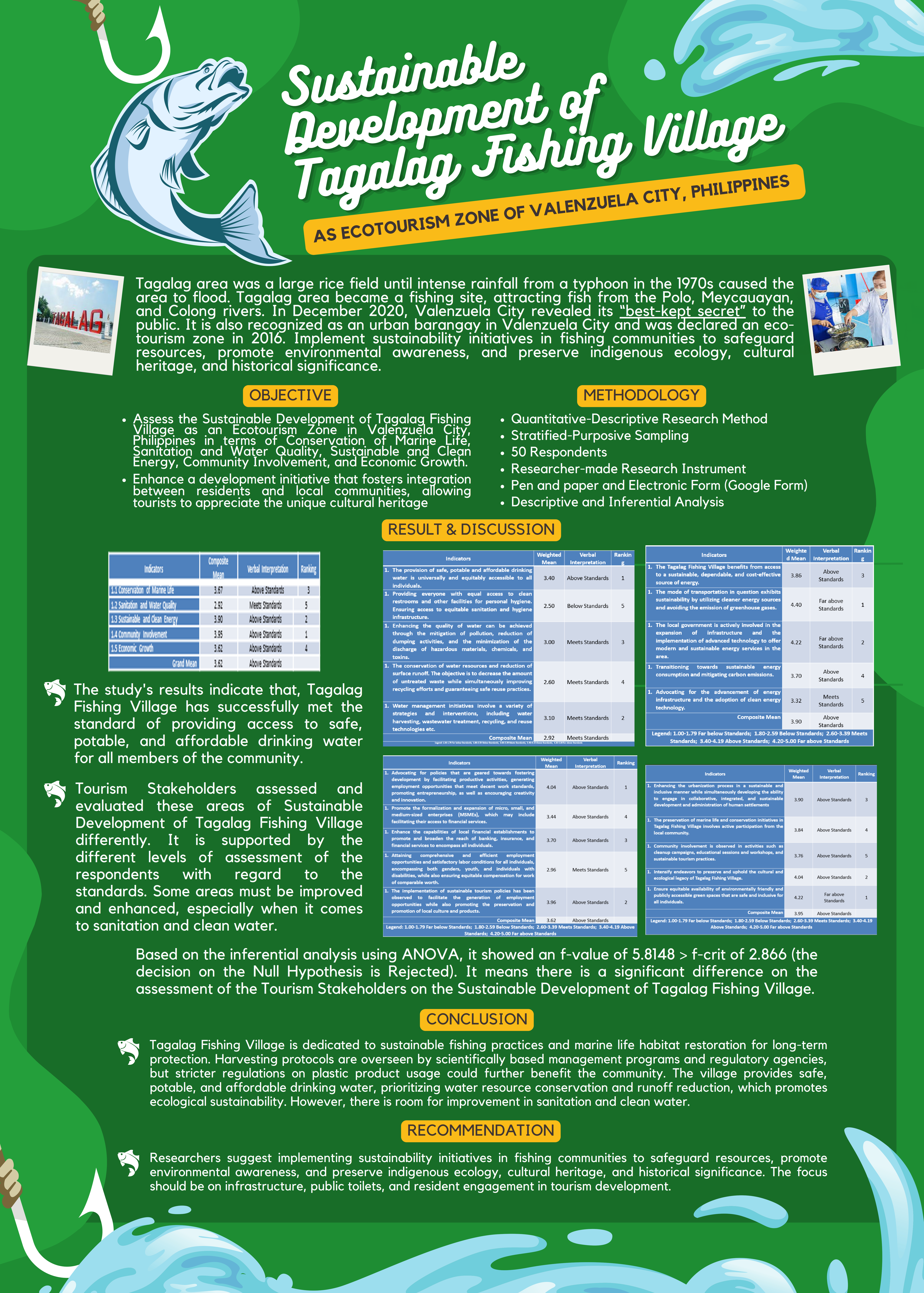Abstract
Tagalag, an urban barangay in Valenzuela, has been providing fish supplies to its city since the 1980s. The barangay was established after a massive flood, and in 2016, it was declared a city eco-tourism zone. The Sustainable Development Goals (SDGs) prioritize economic growth, social inclusion, and sustainable development, encompassing objectives pertaining to the tourism sector. The application of the Sustainable Development Goals (SDGs) to the tourism sector has been undertaken by the World Tourism Organization (UNWTO), with the aim of advocating for the implementation of sustainable, equitable, and environmentally friendly practices within the tourism industry. Sustainable tourism encompasses the comprehensive evaluation of its societal, ecological, and economic consequences while simultaneously addressing the requirements of both tourists and local communities, safeguarding natural resources, and mitigating adverse environmental effects. Under the SDG #6 Clean Water and Sanitation this goal is making sure about the Tagalag fishing village has an availability of clean water and good sanitation by all and how this can be sustained in the Tagalag community which the researchers do some recommended plan for the community
Tagalag Fishing Village is dedicated to sustainable fishing practices and marine life habitat restoration, implementing scientifically based management programs and regulatory agencies. The village prioritizes water resource conservation and surface runoff reduction but could benefit from enhancing infrastructure and promoting sustainable development. The village's economic growth is exemplary, with policies promoting economic growth, job opportunities, entrepreneurial endeavors, and indigenous culture preservation. However, there is room for improvement in sanitation and clean water.
References
2. Shi, L.; Han, L.; Yang, F.; Gao, L. The Evolution of Sustainable Development Theory: Types, Goals, and Research Prospects. Sustainability, 2019, 11(24), 7158.
3. He F.; Jähnig, S.C.; Wetzig, A.; Langhans, S.D. More Exposure Opportunities for Promoting Freshwater Conservation. Aquat. Conserv. Mar. Freshw. Ecosyst., 2021, 31(12): 3626–3635.
4. Rahman, M.K.; Masud, M.M.; Akhtar, R.; Hossain, M.M. Impact of Community Participation on Sustainable Development of Marine Protected Areas: Assessment of Ecotourism Development. Int. J. Tour. Res., 2022, 24, 33–43.
5. Sánchez-Rodríguez, A.; Aburto-Oropeza, O.; Erisman, B.; Jiménez-Esquivel, V. M.; Hinojosa- Arango, G. Rocky reefs: preserving biodiversity for the benefit of the communities in the aquarium of the world Ethnobiology of Corals and Coral Reefs eds N Narchi and L Price, Switzerland, Springer International Publishing, 2015, 177–208.
6. Wake, A. A. Impacts of Fishing on The Rural Household Income; Evidence From Ethiopian Rift-Valley, Cogent Economics & Finance, 2022, 10(1), 57-61, doi.org/10.1080/23322039.2022.2124737.
7. Herbert-Read, J.E.; et al. A Global Horizon Scan of Issues Impacting Marine and Coastal Biodiversity Conservation. Nat. Ecol. Evol., 2022, 6, 1262–1270.
8. Dobson, A.; Cattadori, I.; Holt, R. D.; Ostfeld, R. S.; Keesing, F.; et al. Sacred Cows and Sympathetic Squirrels: The Importance of Biological Diversity to Human Health. PLOS Medicine, 2006, 3(6): e231. https://doi.org/10.1371/journal.pmed.0030231.
9. Prastyo, N. The Bad Impact of Plastic Waste on The Conservation of Marine Animals as Source of Inspiration of Vector Artwork. Arty: Jurnal Seni Rupa, 2020, 9(3), 253 - 266.
10. Eriksson, B.; Johansson, F.; Blicharska, M. Socio-economic impacts of marine conservation efforts in three Indonesian fishing communities. Mar. Policy, 2019, 103 59-67, doi:10.1016/j.marpol.2019.02.007.
11. Shasha, Z. T.; Geng, Y.; Sun, H.P.; Musakwa, W.; Sun, L. Past, Current, and Future Perspectives on Eco-Tourism: A Bibliometric Review Between 2001 and 2018. Environmental Science and Pollution Research, 2020, 27(19), 23514–23528, doi: 10.1007/s11356-020-08584-9.
12. González, R.C.L.; Piñeiro Antelo, M.D.L.Á. Fishing Tourism as an Opportunity for Sustainable Rural Development – The Case of Galicia. Spain. Land, 2020, 9, 437.
13. Dodds, R.; Ali, A.; Galaski, K. Mobilizing Knowledge: Determining Key Elements for Success and Pitfalls in Developing Community-Based Tourism. Current Issues in Tourism, 2018, 21(13), 1547–1568. https://doi.org/10.1080/13683500.2016.11502578.
Authors

This work is licensed under a Creative Commons Attribution 4.0 International License.

Media Konservasi is an open access journal, meaning that all content is freely available without charge to the user or their institution. Users are allowed to read, download, copy, distribute, print, search, or link to the full texts of the articles in this journal without needing to request prior permission from the publisher or the author.
All articles published by Media Konservasi are licensed under the Creative Commons Attribution 4.0 International License. This allows for unrestricted use, distribution, and reproduction in any medium, provided proper credit is given to the original authors.
Authors submitting manuscripts should understand and agree that the copyright of published manuscripts is retained by the authors. Copyright encompasses the exclusive rights of authors to reproduce, distribute, and sell any part of the journal articles in all forms and media. Reproduction of any part of this journal, its storage in databases, and its transmission by any form or media is allowed without written permission from Media Konservasi.

